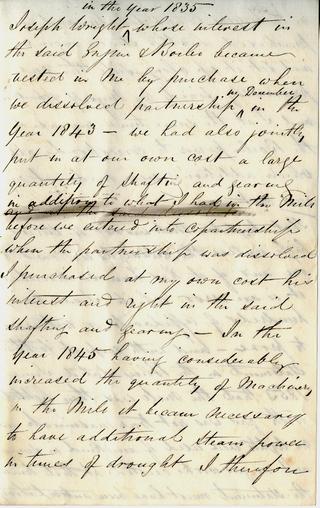
Coates and Wright
Coates and Wright was a partnership between John Thomas Coates and Joseph Wright that owned and operated the cotton spinning mill located in Ingleton, North Yorkshire, until 1844. This mill had originally been built in 1791 and was run by a partnership between George Armistead, Ephriam Ellis, William Petty and Thomas Wigglesworth, trading as George Armistead and Co. In 1807 the mill, along with its machinery, was placed for sale although this did not cover the whole premises as part of it was to be leased from a Thomas Lister Parker. It appears to be at this point that the mill was purchased by John Coates and Son to spin flax and tow. This company, also known as Coates and Co, was a partnership between John Thomas Coates, a J. Coates and a T. Albright that would last until 1820 when it was dissolved. Coates would then enter into a partnership with George Haworth, operating as John Coates and Company, which converted the mill back to cotton spinning. They would continue until the partnership was declared bankrupt in 1832, with George Haworth spending time in the debtor’s prison in York. Sometime after this John Coates would enter into a partnership with Joseph Wright the younger. This would be known and Coates and Wright, which continued until 1844 when it was dissolved by mutual consent.
It then appears that Coates continued to operate the mill on his own, being described as a cotton spinner at Bridge End House, Ingleton, in a 1845 list of promoters for the Keighley, Halifax and Huddersfield Junction Railway. In April 1854 Ingleton Mill was destroyed by a fire that caused between £7,000 and £8,000 in damages, although both the house and the steam engines were saved. Following this the mill was rebuilt and continued to be operated by Coates until 1881 when it, along with all machinery and stores, were offered for sale. At the time the machinery included 2 warping mills, 50 spinning frames, 24 carding engines, 3 drawing frames, 2 slubbing frames, 3 intermediates, 7 roving frames and 2 scutching machines all by Walker and Hacking of Bury.
The mill continued to operate following this and at some point was converted to a hemp manufactory, until it was again destroyed by fire in October 1904. This time it was not rebuilt but sold in 1905 as the site and ruins of Ingleton mill along with the water wheel, house and water rights. The engine and boiler house were also sold separately.
